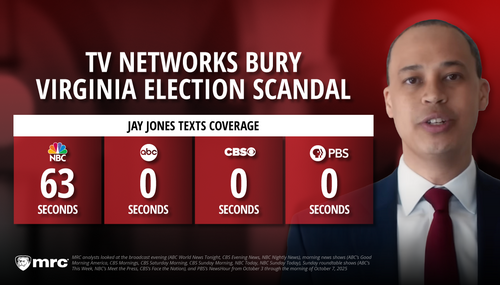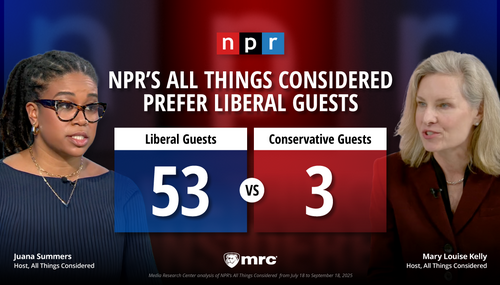FBI director James Comey endured condemnation from conservatives for his weak-kneed decision not to prosecute Hillary Clinton for gross negligence in handling classified documents as Secretary of State.
But New York Times reporters Michael Schmidt and Eric Lichtblau gave him an atta-boy on the front page of Wednesday’s edition, paying tribute to his toughness, patience, and principles -- while still chiding him for disagreeing with the Obama administration on police brutality: “Public Scolding of Clinton Fits A Pattern of Taking On Power.”
The Times was awfully confident that Hillary Clinton did nothing legally wrong:
Shortly after Hillary Clinton was interviewed on Saturday by agents at the F.B.I.’s headquarters, its director, James B. Comey, heard from his deputies that Mrs. Clinton had been truthful and forthcoming in the three-and-a-half-hour meeting.
Mr. Comey, who had been regularly briefed on the progress of the yearlong investigation into Mrs. Clinton’s email account as secretary of state, had known for some time that his agents had not uncovered enough evidence to charge her or anyone else with a crime. Now, with the interview done, he told his deputies, according to F.B.I. officials, that he wanted to move forward with a plan he had been working on for months to explain the findings from such a politically contentious investigation to the public. And he did not wait to do it.
At 11 a.m. on Tuesday, Mr. Comey walked into a conference room on the first floor of the F.B.I.’s headquarters, where he stood behind a lectern for 15 minutes and laid out in clinical detail how Mrs. Clinton’s use of the account was “extremely careless.” But, he said, the bureau would recommend to the Justice Department that she not be charged with a crime because his investigators had found no clear evidence that Mrs. Clinton had intentionally broken the law.
The careful approach to publicly explaining his thinking fit a pattern for Mr. Comey, who, throughout his three decades as a law enforcement official, has refused to shy away from politically fraught issues. While he was immediately praised by some for his candor and transparency, it did not insulate him from criticism from both Republicans and Democrats, as well as some legal experts.
Republicans contended that Mr. Comey had rushed the decision to clear Mrs. Clinton before the bureau had time to digest what she had said in the interview, and that his decision came suspiciously close to Attorney General Loretta Lynch’s impromptu meeting with former President Bill Clinton only a week before. They said Mr. Comey’s own description of the F.B.I.’s findings on Tuesday was enough evidence to file criminal charges.
....
Mrs. Clinton’s supporters and other Democrats contended that Mr. Comey had talked too much, saying it was not fair for him to have laid out the details in a case in which she will not be charged.
In the paper’s eyes, Comey’s defiance burnished his reputation when it was aimed against the Bush administration, but dubious when he took aim at the Obama White House.
As deputy attorney general in the George W. Bush administration, Mr. Comey was at the center of a dramatic dispute with administration officials in 2004, when he refused to reauthorize a secret National Security Agency wiretapping program put into place after the Sept. 11, 2001, terror attacks.
Mr. Comey believed parts of the warrantless wiretapping program might have been illegal. That led to a showdown in a Washington hospital room, where Attorney General John Ashcroft was ill. Two of Mr. Bush’s top aides, Andrew H. Card Jr. and Alberto R. Gonzales, were trying to pressure Mr. Ashcroft to sign the order.
Mr. Comey met with Mr. Bush the next day about the episode, and he and more than a dozen other officials threatened to resign over what they saw as a usurpation of power by White House officials.
....
President Obama appointed Mr. Comey in 2013 to head the F.B.I., but Mr. Comey has not shied away from clashing with the administration. Last October, Mr. Comey gave a speech in which he said that additional scrutiny and criticism of police officers after several highly publicized episodes of police brutality might have led to an increase in violent crime in some cities because officers had become less aggressive.
“I’ve been told by a senior police leader who urged his force to remember that their political leadership has no tolerance for a viral video,” Mr. Comey said in his speech, adding that many leaders and police officers to whom he had spoken said they were afraid to address the issue publicly.
The speech angered senior White House officials, who contended that Mr. Comey had no evidence to back up his claims and that he was undermining their efforts to overhaul the criminal justice system. Just days after the speech, Mr. Comey met with Mr. Obama in the Oval Office to discuss their views, but he has continued to voice his opinion on the topic -- even as White House officials have maintained there is little evidence to support his views.
Lichtblau vigorously defended Obama from Comey on this issue in May. (Here's some of that missing "evidence," from crime expert Heather McDonald.)




